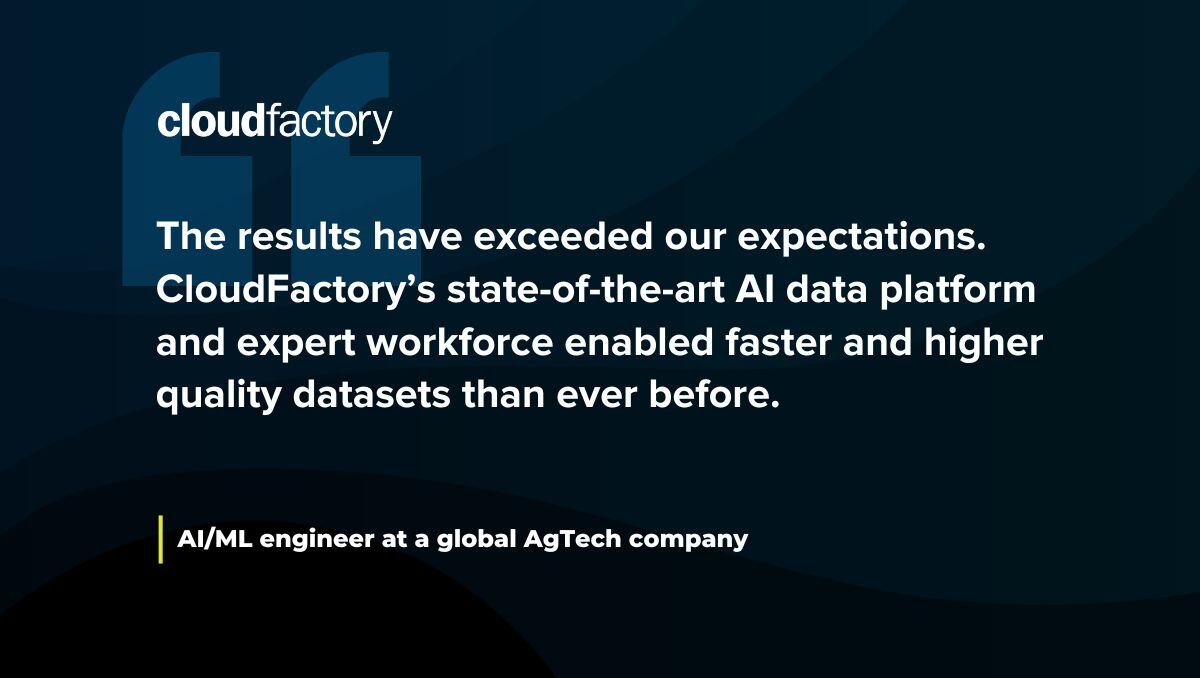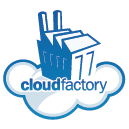Agricultural technology (AgTech) is transforming farming with artificial intelligence (AI) and machine learning (ML) solutions. These technologies have the potential to revolutionize how we grow food by making farming more efficient, sustainable, and data-driven.
However, implementing AI in agriculture presents unique challenges that must be addressed to effectively realize these benefits. Using real-world examples, let’s explore three significant challenges AgTech companies face when building AI-powered solutions and discuss the role of advanced data labeling solutions like CloudFactory's Accelerated Annotation.
Understanding AgTech key challenges
Challenge 1: Data diversity and scalability
AgTech companies work with various crop types, each requiring different care and cultivation techniques. This diversity means that AI models must handle a wide variety of data inputs—from soil health metrics to pest infestation images. The scalability challenge arises when these models need to process large volumes of data across different geographical areas and crop types to prove their efficacy and versatility.
Real-world scenario:
A global leader in agricultural innovation and technology needs to develop a new computer vision service to help farmers make better choices regarding the selection and application of farming products. The diversity of crops and the large amounts of data associated with them led the company to evaluate a solution that could handle the complexity and scale of data from numerous crop types. To do so, they needed to analyze various crop types quickly to prove their concept for broader adoption. Their AI models must adapt to new data from varied climates and crop species to scale, necessitating robust and scalable data handling and processing capabilities.
Challenge 2: Seasonal fluctuations and project continuity
Agriculture is deeply influenced by seasons, affecting data availability for training AI models. For example, data on winter crops cannot be collected in summer and vice versa. This seasonality disrupts continuous data flow and can delay AI model training and deployment.
Real-world scenario:
An AgTech firm wants to develop AI models predicting crop yields—but they also need to adapt to varying data flows throughout the year to ensure continuous implementation and effectiveness. They struggle, however, with the seasonal nature of data collection, which limits model training opportunities to specific times of the year. The solution involves creating a flexible development schedule that aligns with crop cycles and using historical data to augment real-time data collection, thereby maintaining project continuity.
Challenge 3: Expertise gap and data labeling bottleneck
AI development in agriculture requires technical AI expertise and a deep understanding of agronomy. The need for more professionals who possess both sets of skills creates an expertise gap. In addition, the success of AI models depends heavily on accurately labeled data, making data labeling a critical but often bottlenecked process due to the expertise required and the volume of data.
Real-world scenario:
A company specializing in crop disease prediction must label thousands of crop leaf images to train its diagnostic models. They understand that developing AI solutions in agriculture requires a deep understanding of the field, similar to that of Ph.D.-level specialists. The specialized knowledge required to identify and label different stages of disease progression accurately made it challenging to find qualified data annotators, creating a significant bottleneck that jeopardized the project’s timeline and return on investment (ROI).

Addressing the challenges with CloudFactory's Accelerated Annotation
CloudFactory's Accelerated Annotation solution offers a comprehensive approach to tackle these challenges:
-
Scalability and diversity management
Accelerated Annotation supports various data formats and can scale operations up or down based on project needs. This flexibility is needed for efficiently handling the diversity and volume of agricultural data. -
Adaptation to seasonal data
With its ability to quickly start and stop projects, CloudFactory’s Accelerated Annotation AI-powered labeling platform, supported by a flexible and highly-trained workforce, aligns well with the seasonal nature of agricultural data collection. This allows AgTech companies to plan their data labeling tasks according to their data availability and provides the scalability required when use case needs fluctuate. -
Expertise and efficiency in data labeling
CloudFactory leverages a skilled workforce trained in specific domains, including precision agriculture to provide high-quality data labeling services. This addresses the expertise gap by ensuring that data is labeled accurately, which is critical for training effective AI models.
 Accelerated Annotation is built around iterative, AI-driven workflows that drive quality, accuracy, and speed. It's designed to streamline the data labeling process and enhance the speed and quality of data that drives AI initiatives.
Accelerated Annotation is built around iterative, AI-driven workflows that drive quality, accuracy, and speed. It's designed to streamline the data labeling process and enhance the speed and quality of data that drives AI initiatives.
Accelerated Annotation is the ideal solution to help AgTech companies overcome their challenges, allowing them to succeed and get AI models into production faster. Some benefits companies were able to realize with Accelerated Annotation include the ability to:
- Automate tasks even with small datasets, then seamlessly scale up for larger projects or switch to new use cases as needed.
- Quickly start new data labeling projects for different crops.
- Return to focus on innovation and not worry about data management.
- Leverage a skilled workforce and advanced ML algorithms for high-quality data labeling.
- Get the data needed to develop and deploy AI models quickly.
Accelerated Annotation, equipped with advanced ML algorithms and rigorous quality control, tackles companies' intricate data labeling needs for computer vision projects. Every data point is precisely annotated, unlocking valuable insights from vast visual and sensor datasets.
Measurable Success
The results are impressive – here are a few examples:
- 40% faster ML workflows led to higher throughput.
- 70% reduction in QA costs, enhancing overall efficiency.
- 100% QA on all labeled data, ensuring high-quality outputs.
By integrating solutions like CloudFactory's Accelerated Annotation, AgTech companies can more effectively manage the data challenges associated with applying AI to agriculture. This leads to faster deployment of AI models, reduced costs, and improved outcomes, which in turn contribute to more sustainable farming practices and increased crop yields.



